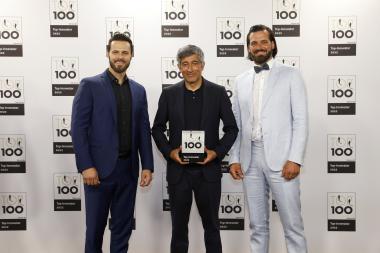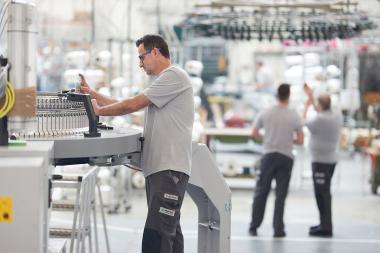Ranga Yogeshwar presents third Top 100 award to Mayer & Cie.
Albstadt-based Mayer & Cie. has been named a Top 100 award-winner for the third time as one of Germany’s most innovative small and mid-range businesses. The jury made special mention of the circular knitting and braiding machine manufacturer’s innovative processes. At the centre of the family firm’s further digital development is on the aim to boost its customers’ productivity. Last Friday, 25 June, members of the Mayer & Cie. management received the award from the science journalist Ranga Yogeshwar at the SMB summit in Frankfurt am Main.
For some time now, the focus of development work at Mayer & Cie. has been on lean management in assembly processes, on optimisation of aftersales service, including setting up an online shop for spare parts, and on product lifecycle management, or PLM, which stands for a concept of seamless integration of all the information that arises during a product’s lifecycle. A clean data structure is the basis for these measures, it’s called the “digital backbone”. It means that all product data is processed in the same database and all information is available only once and can be downloaded immediately.
In all, 436 companies, including about ten per cent from machinery and plant engineering, competed for the Top 100 seal of innovation this year. Nearly 300 were successful and were congratulated in person by Ranga Yogeshwar at the SMB summit. He noted that the award winners set a role model example. “Innovators are thought leaders; they are always pioneers too,” said Yogeshwar, who mentors the competition. “They put their products to the test and ask themselves what an ecological society and a climate-oriented world will require of them. And they check the opportunities and challenges that increasing digitisation will bring for forms of cooperation, social relationships and, with them, for employee retention.”
Mayer & Cie.













